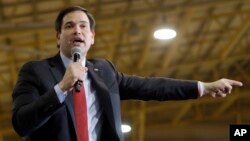Marco Rubio finds his Oval Office ambitions squeezed by Donald Trump's outsider ambush and the Republican Party's resulting identity crisis.
The Florida senator has struggled to reconnect with the kind of voters who sent him to Capitol Hill six years ago as a tea party favorite, instead watching them fuel Trump and his closest challenger to winning the GOP presidential nomination, Texas Sen. Ted Cruz.
Yet left to depend on more traditional Republicans, Rubio also has not fully harnessed the financial and organizational muscle of the GOP old-guard eager to derail Trump, with some backers of failed candidates like Jeb Bush remaining on the sidelines and others supporting Ohio Gov. John Kasich. And even where Rubio has corralled establishment players, voters haven't always followed.
Rubio insists he feels “real good about the map as we move forward,” telling the Associated Press in an interview late Sunday he believes voters across the GOP spectrum want “an optimistic message of conservatism,” not just “anger and frustration.”
But the result of Rubio's pitch so far is two wins out of 20 nominating contests - the second coming Sunday in Puerto Rico - and now he faces a must-win March 15 primary in his home state, where polls suggest Trump remains well-positioned to capture the winner-take-all prize of 99 delegates.
Rubio said he doesn't want to be cast either as an establishment figure or an outsider incapable of getting anything done. “I've only been in the Senate for five years, and I've kept my promises to fight hard against the status quo, and that's why I'm running for president,” he said.
And he is projecting confidence hopscotching from Puerto Rico to Idaho and back to Florida after a string of defeats from Super Tuesday through Saturday. “We're going to win Florida,” he promises, ahead of a “long slog” for delegates thereafter.
Still, his conundrum is on full display.
In Wichita, Kansas, he declared: “Every traditional institution in America is failing you.'' He named “the media ... higher education ... big business ... and, by the way ... your politicians and your political parties.”
Rubio tells the story of his 2010 Senate bid, when he “took on” the “Washington establishment” by running against prohibitive favorite and then-Gov. Charlie Crist in the GOP primary.
Yet the senator also touts his 15 years in government - what he pitches as “taking conservative principles and turning them into conservative action.” Even more noteworthy, he embraces elected officials at one campaign rally after another.
In Idaho, which hosts its primary Tuesday, Sen. James Risch praised his colleague's effectiveness and support for the Idaho National Laboratory, a federal energy research installation.
In Kansas, Gov. Sam Brownback, Sen. Pat Roberts and Rep. Mike Pompeo took the stage. Brownback - who has abysmal approval ratings amid sweeping state budget cuts - drew boos in Kansas City when called upon to introduce his guest. A day later, Rubio garnered 17 percent in the Kansas caucus, another third-place finish behind Cruz and Trump.
Rubio has campaigned with South Carolina Gov. Nikki Haley and former Louisiana Gov. Bobby Jindal. He lost both their states, registering just 11 percent on Jindal's home turf.
In Puerto Rico, the senator held forth in English and Spanish on the island territory's debt crisis and stagnant economy. “Your government spends more money than it takes in,” while high taxes and regulations “make it harder to do business,” he said. He did so surrounded by Puerto Rican power players.
Though he affirms the anti-establishment fervor, Rubio also takes shots at Trump and what the GOP leader calls a “movement” of the “silent majority.”
“Don't give into the fear,” Rubio told supporters Sunday in Idaho Falls, Idaho. “Do not allow the conservative movement to be defined as anger.”
In Kansas, he offered a more ominous warning. “Every movement in human history that has been built on a foundation of anger and fear,” he said, “has been cataclysmic in the end.”
In his most explicit moments, Rubio declares Trump's nomination “would shatter the party and the conservative movement.” Of course, he later told reporters in Kansas that he would support Trump if he is the nominee.
Some of Rubio's supporters explain the apparent tightrope.
Mike Moody, a 68-year-old veterinarian in Eureka, Kansas, called Trump “unstable” and not “trustworthy,” adding that his supporters are “idiots if they think Mexico is going to pay for that wall” at the U.S-Mexico border.
But, Moody says, “I'm going to vote Republican in November no matter what.”
For his part, Rubio rejects any notion that his approach is haphazard or perhaps contradictory, instead framing it as the only way to “unite this party” and, ultimately, the country.
“I will seek to be the president for all Americans, even those who don't vote for me,” Rubio said.
But, for now, he clearly needs more of them to do just that.




